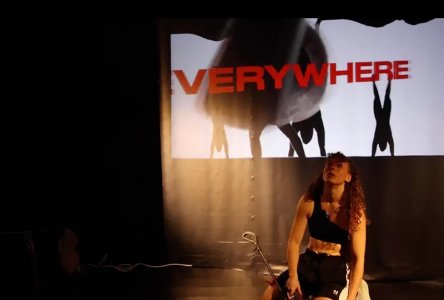
SAINTS OF DAMOUR
SAINTS OF DAMOUR, The Loading Dock, Qtopia, Darlinghurst. 19 March – 5 April 2025. Photography by Emma Elias
A new play by James Elazzi is an event, and Saints of Damour is one such. It delivers a remarkable journey across decades, from a 70s fishing village near Beirut, to dreary, baking Goondiwindi, and then to gay 80s Sydney. The central figure is Pierre (Antony Makhlouf), who grows tomatoes, hand to mouth, with his widowed mother Zienab (Deborah Galanos). He sells them in the marketplace, while she’s on constant alert for a suitable wife for him, and for slights from her neighbours and rich sister in Beirut.
One morning Pierre’s spruiking of his wares is observed and interrupted by Samir (Saro Lepejian). He’s a welder and working on the nearby fishing boats. The attraction is instant if low-key, this is, after all, rural Christian Lebanon. Also observing Pierre with similar feelings is Layla (Nicole Chamoun). Her father is owed money by Pierre’s late father and Zienab dreams up a scheme: the debt will be canceled if Pierre and Layla marry. She can see no problem with it – her son has to marry, and he will marry Layla. That he doesn’t want to, for whatever reason, is not to be countenanced.
News is slow to reach Damour so when shellfire erupts in the mountains it signals the beginning of what would later be known as the 15-year civil war. The village is consumed by fear and chaos. Layla’s sister has already emigrated to a peculiar place on the far side of the moon called “Ow-strah-lee”. As war intensifies and people they know are killed, Zienab and Layla see emigration as the only solution. Pierre is torn between filial duty and Samir. Despite Zienab’s suspicion, it’s decided they will all go to Australia, and Pierre and Layla marry.

Goondiwindi is where they fetch up, with Samir left behind in the confusion – to follow when he can. Back then the town was mainly known for Gunsynd, a racehorse, and although it’s on the banks of the Macintyre river, Goondi’s an arid dump after the Mediterranean loveliness of Damour. From the steeply raked seats of Qtopia’s Loading Dock theatre, the smell of droughty dust and the skin-prickling humidity are tangible as Layla hates the place, Zienab soldiers on and Pierre longs for Samir. The shop they’ve scrabbled to open is shunned by locals, and it’s also possible to feel the hostility aimed at the newcomers, even when – and possibly because – they go to church. They move to Sydney.
A different kind of civil war rages in the city, and across the world, in the 80s. On one side is a seemingly invulnerable foe: HIV-AIDS. On the front line in the early years are gay men. The final act of this fine – if overlong play plunges into hedonistic nightlife along with Pierre. He is devastated by Samir’s death – in a massacre. Already signaled to us as he watches Pierre from the sidelines dressed in a black suit, white shirt and bare feet – the infamous “Paul is dead” image from Abbey Road. The end for Pierre is inevitable when he meets and takes up with the freewheeling sybarite Todd (Max Cattana). Disco nights and sex every other which way mean freedom from Australia’s hitherto stultifying wowserism. It’s joyous until it isn’t.
However, Saints of Damour is dramatically strongest and most compelling in its depiction of traditional Lebanese Christian village life, its family focus, and anachronisms. Similarly effective is the middle act of life in rural Queensland where discrimination and isolation are only as miserable as the cultural desert and actual drought. Ironically, the third act, depicting Pierre’s grief-driven but pleasure-seeking Darlinghurst nights, verges on same same but (just a bit) different. Think Matthew Lopez’s The Inheritance, Larry Kramer’s Normal Heart, Angels in America – Tony Kushner, and many more. All “gay plays”, yet Saints of Damour is so much more and could be even more minus 30 minutes and the interval.

Direction by Anthony Skuse is typically impeccable, sensitive, and intelligent. (His choice of incidental music – fragments of Eleni Karaindrou’s film soundtrack for The Weeping Meadow – is perfect.) In assembling the exceptional cast he pinpoints each character with emotional and physical accuracy, and the actors flawlessly inhabit their roles. First among equals, however, is Deborah Galanos. Able to convey something when apparently doing nothing, when she does do something she provokes laughter, magnetic presence, and finally, the full terrible circle of motherhood when many in the audience are reduced to sobs. Congratulations all round.
Comments
Leave a Comment
Enter your username and password to comment. Don't have a username? Register now.

-c444x300.jpeg)


Be the first to leave a comment below